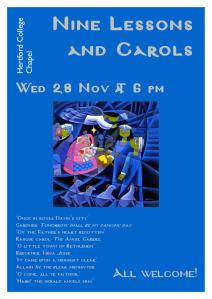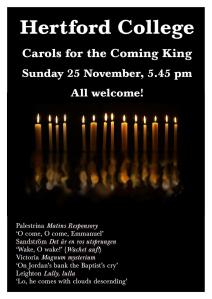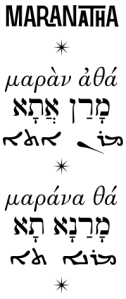As Christmas approaches, Western Christian tradition has hallowed each evening from mid-Advent to 23 December with the singing of particular antiphons at Magnificat of Evening Prayer. Each antiphon recalls an epithet of Christ, and begins with the vocative ‘O …’, giving them the name of ‘O Antiphons’. The texts of the antiphons is the basis for the Advent carol ‘O come, O come, Emmanuel‘. These evenings are often also known as ‘Golden Nights’.
The Sarum Rite, on which much English liturgical tradition is based, begins on 16 December with O Sapientia, ‘O Wisdom’, and the Book of Common Prayer marks the date as such in its calendar (yet provides no other text or instruction).
The official use of the Roman Catholic Church is to start a day after, singing O Sapientia on 17 December, and Common Worship follows that use .
It seems that the Sarum version of eight antiphons from 16 to 23 December was a development of the use of seven antiphons from 17 to 23 December, adding O Virgo Virginum (‘O Virgin of virgins’) to the end of the series. There is a good theological reason to revert to the use of seven antiphons: all seven are addressed to Christ in prophetic epithets, while the additional, eighth antiphon is addressed to the Blessed Virgin Mary. Although devotion to Mary right before Christmas is commendable, it does break the unity of the antiphons.
| Latin title | English title | CW dates | Sarum dates |
|---|---|---|---|
| O Sapientia | O Wisdom | 17 Dec. | 16 Dec. |
| O Adonai | O Lord | 18 Dec. | 17 Dec. |
| O Radix Jesse | O Root of Jesse | 19 Dec. | 18 Dec. |
| O Clavis David | O Key of David | 20 Dec. | 19 Dec. |
| O Oriens | O Dayspring, O Morning Star | 21 Dec. | 20 Dec. |
| O Rex Gentium | O King of the Nations | 22 Dec. | 21 Dec. |
| O Emmanuel | O God with Us | 23 Dec. | 22 Dec. |
| O Virgo Virginum | O Virgin of Virgins | — | 23 Dec. |
Some traditions added another antiphon O Gabriel, while some had O Thoma Didyme for the feast of St Thomas on 21 December instead of it. That brought the number to nine antiphons, and it was natural some would expand the series to the biblical twelve, adding O Rex Pacifice ‘O King of Peace’, O Mundi Domina ‘O Mistress of the World’ and O Hierusalem ‘O Jerusalem’, and beginning on 12 December, the eve of St Lucy. The New English Hymnal provides the plainsong music for the antiphons (NEH 503, with the chant for Magnificat at 504).
Related articles
- Parents: Get ready for the O Antiphons (supertradmum-etheldredasplace.blogspot.com)
- Advent – O Antiphon Houses (pinewoodcastle.typepad.com)
- The O Antiphons (str.typepad.com)







